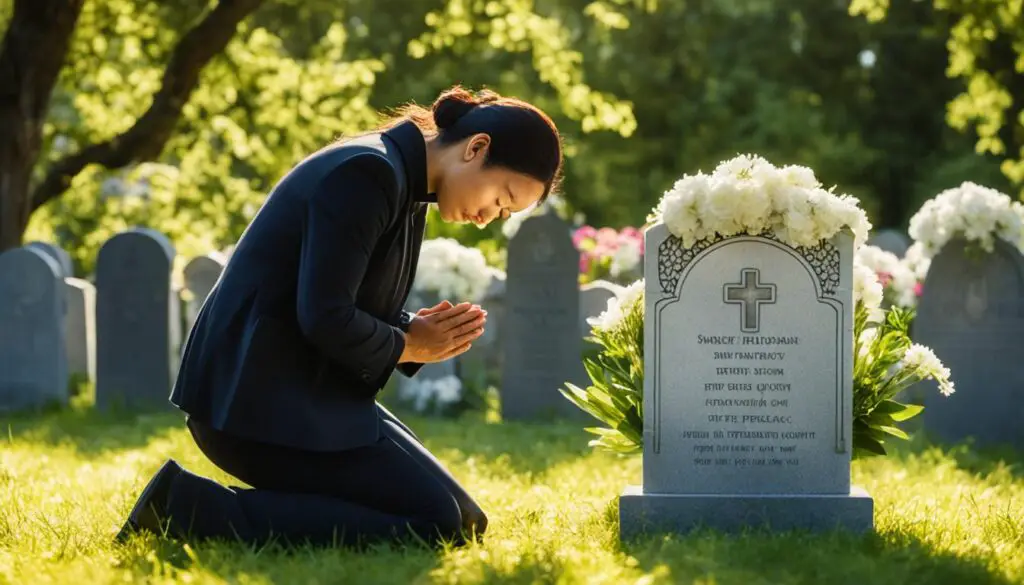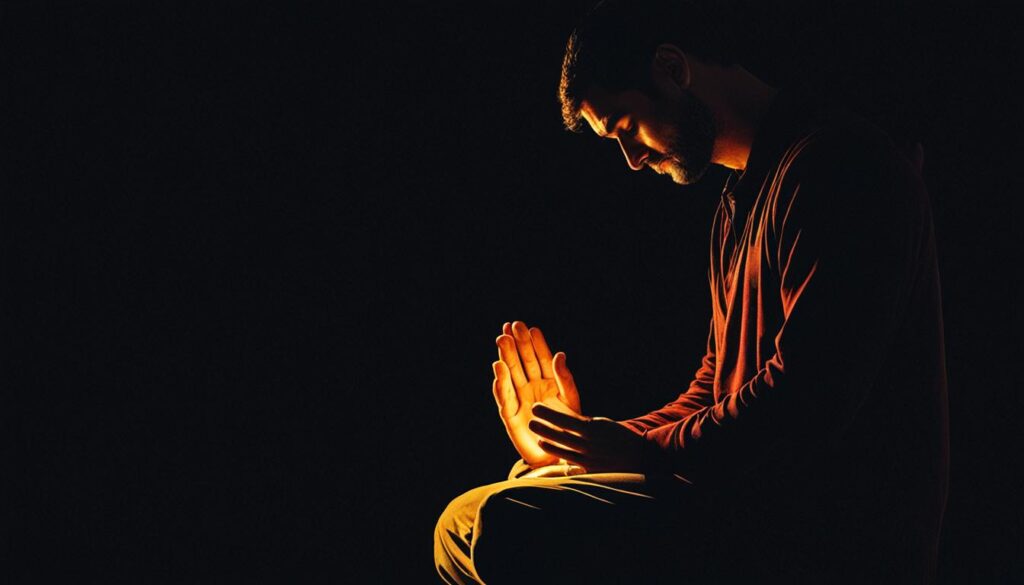In many cultures and religions, the mourning process extends beyond the funeral and lasts for 40 days. It is believed that during these 40 days, the soul of the deceased continues to wander the Earth, visiting significant places from their life. At the end of the 40 days, the soul finally departs from this world. Many families choose to host a celebration on this 40th-day mark to honor the deceased.
Key Takeaways
- Observing a 40-day mourning period is a common practice in various religions and cultures.
- The 40th day after death is significant as the soul is believed to depart from this world.
- Families often host a celebration to honor the deceased on the 40th-day mark.
- Prayer plays a crucial role during the 40 days after death, offering comfort and healing.
- Each religion has its own traditions and practices for the 40 days after death.
The History of 40 Days After Death
The practice of observing 40 days after death has a rich historical significance in various religions and cultures. Let’s explore the origins and traditions associated with this period of mourning and remembrance.
In Judaism, the number 40 holds symbolic meaning of completion and fullness. It is based on biblical references such as the 40 days and nights of rain during the Great Flood and the Israelites’ 40 years in the desert. In Jewish tradition, mourning lasts for seven days, but the concept of 40 days after death has influenced some communities as a time of remembrance.
In Islam, the Prophet Muhammad received his first divine revelation at the age of 40. The number 40 is seen as a significant period of spiritual awakening and transformation. While mourning practices may vary across different Islamic cultures, the commemoration of 40 days after death is recognized as a time of reflection and prayer.
Christianity also holds references to the number 40 in the Bible. It represents a period of trial, testing, and preparation. Noah endured 40 days and nights of rain before the rainbow appeared as a sign of God’s covenant. Jesus fasted in the wilderness for 40 days, facing temptation and strengthening his faith. As a result, observing 40 days after death aligns with the biblical symbolism of spiritual growth and transformation.
The Significance of 40 Days After Death
The tradition of observing 40 days after death holds deep cultural and spiritual significance. It allows grieving families and friends to honor the memory of their loved ones and find solace during the mourning period. The duration of 40 days is seen as a time for the soul to complete its journey on Earth before departing to the afterlife.
“The practice of observing 40 days after death provides a framework for mourning and allows loved ones to continue their relationship with the deceased, even as they journey to their final resting place.”
Through prayer and remembrance, individuals can find strength, healing, and closure during this period. It is a time to reflect on the life and impact of the departed, seek divine guidance, and express gratitude for the memories shared. The 40 days after death serve as a bridge between the earthly realm and the spiritual realm, offering comfort and hope to those left behind.
Traditions of 40 Days After Death
Various rituals and customs are associated with the 40 days after death, varying across different cultures and religions. These may include:
- Prayer gatherings at the home of the deceased, where family and friends come together to offer their condolences and support.
- Visiting the gravesite to pay respects and offer prayers for the departed soul.
- Performing acts of charity or giving donations in honor of the deceased.
- Lighting candles or burning incense as a symbol of remembrance and spiritual connection.
These traditions provide a sense of community, comfort, and connection to the departed. They serve as a reminder that the memory and legacy of the loved one will continue to live on.
| Religion | Symbolic Significance |
|---|---|
| Judaism | Completion and fullness |
| Islam | Spiritual awakening and transformation |
| Christianity | Trial, testing, and preparation |
When to Start Counting the 40 Days After Death
Traditionally, the 40-day count begins on the day following the death. This is because the day of passing is considered “Day 0,” a time of immediate grief and arrangements. Therefore, the first full day after the passing becomes “Day 1” of the 40-day mourning period. However, individual beliefs and cultural nuances may influence the timing, with some starting the count from the day of death itself.
Timing of the 40 Days After Death
The timing of the 40 days after death holds significant importance in various cultures and religions. While there is a traditional approach that starts the count from the day following the death, other beliefs and practices may prioritize the day of death itself. This discrepancy in timing stems from different interpretations and understandings of the mourning period.
“The 40-day mourning period is not just a prescribed length of time; it represents a symbolic journey of the soul and the grieving process for the living.” – Religious scholar
In some cultures, the 40 days after death are viewed as a transitional period during which the soul of the deceased undergoes a spiritual journey before reaching its final destination in the afterlife. This journey is believed to be essential for the soul’s purification and eventual reunion with God. The timing of the 40 days after death thus symbolizes the completion of this transformative phase.
When Does the 40 Days After Death Start?
The starting point of the 40-day count depends on various factors, including religious customs, cultural traditions, and personal preferences. While some individuals and communities strictly adhere to the traditional practice of beginning the count from the day following the death, others choose to align it with the day of death itself.
Those who start counting the 40 days after death from the day of death believe that it provides a more immediate connection to the deceased and a stronger emphasis on honoring their transition to the afterlife. This approach recognizes the significance of the day of passing as a pivotal moment in the soul’s journey, marking the beginning of its spiritual transformation.
Ultimately, the timing of the 40 days after death is a deeply personal and cultural decision. It is a reflection of individual beliefs, spiritual convictions, and the desire to honor and remember the departed loved one in a meaningful way.
By seeking solace in prayer and partaking in the rituals and traditions associated with the 40 days after death, individuals find comfort and guidance during the mourning period. Whether counting from the day following the death or from the day of death itself, the 40-day journey serves as a time of reflection, remembrance, and spiritual connection.
Modern Traditions and Practices in Each Religion
Within different religions, the observance of the 40 days after death varies, reflecting unique traditions and practices. While the soul’s wandering may not be a belief shared across all faiths, the significance of the 40th-day milestone is universally recognized. Let’s explore how various religious communities honor the deceased during this period.
Roman Catholicism:
In Roman Catholicism, the soul is believed to proceed directly to its final destination, without wandering the Earth. Nevertheless, many Catholic cultures have embraced the tradition of commemorating the 40th day after death. Filipino Catholics, for example, hold both a 9th and a 40th-day memorial, where family and friends gather to offer prayers and pay their respects.
Russian Orthodox:
Within Russian Orthodox Christianity, specific prayers are recited on the 1st, 3rd, 9th, and 40th days following a person’s passing. The 40th day holds particular significance, as it signifies the soul’s transition to the afterlife. On this day, family members often come together again for a special memorial service, ensuring that their loved one is remembered and honored.
Greek Orthodox:
Greek Orthodox Christians engage in a 40-day period of mourning, refraining from social gatherings and celebrations. During this time, they hold memorial services to pray for the departed and seek solace. As the 40th day approaches, the significance intensifies, leading to a more elaborate commemoration before the completion of mourning.
“The modern traditions and practices surrounding the 40 days after death allow individuals to express their devotion, find solace in their faith, and honor the memory of their loved ones. Each religion brings its own unique rituals that offer comfort and spiritual healing during this time of mourning.”

| Religion | Practices |
|---|---|
| Roman Catholicism | 9th and 40th-day memorial services |
| Russian Orthodox | Prayers on the 1st, 3rd, 9th, and 40th days |
| Greek Orthodox | 40-day mourning period with memorial services |
Prayers for the Deceased on the 40th Day
On the 40th day after death, a significant milestone is reached in the mourning process. During this day, prayers are offered for the deceased, allowing loved ones to express their deepest sentiments and seek solace in their faith. The specific prayers observed on the 40th day may vary depending on individual religious beliefs and cultural practices. However, their essence remains the same – to offer supplication and remembrance for the departed soul.
One common prayer on the 40th day is a heartfelt plea for eternal rest and peace for the departed. The bereaved pray that the soul finds serenity and tranquility in the afterlife, free from any worldly suffering and tribulations. They seek divine mercy and an everlasting place of comfort for their loved one.
Additionally, prayers on the 40th day often include a request for the guidance of angels to assist the departed soul’s journey to paradise. This prayer signifies the deep desire for a smooth transition and a hope that the angels will protect and guide the soul to its final destination.
“May God’s angels bring you to paradise, and may you find peace in the embrace of the divine.”
The prayers on the 40th day also extend comfort to the grieving family and friends. They call upon the divine to console and strengthen those left behind, offering solace and support during their time of sorrow. These prayers recognize the deep bond between the departed and their loved ones, affirming that they are not forgotten and their memory is cherished.
Furthermore, the prayers express gratitude for the blessings brought by the departed soul during their time on Earth. They reflect on the positive impact they had, the love they shared, and the lessons they taught. These expressions of gratitude serve as a reminder of the profound influence the departed had on the lives of those they touched.
Finally, prayers on the 40th day involve seeking forgiveness and mercy for any shortcomings or mistakes the deceased may have had in their life. This act of repentance and humility acknowledges the imperfections of human nature while emphasizing the belief in a compassionate and forgiving higher power.
Through these prayers, the 40th day after death becomes a time to pay homage, seek solace, and connect with the spiritual realm. It is a sacred moment of reflection, remembrance, and renewal of faith. By offering prayers on this significant day, individuals find comfort, strength, and a sense of peace as they navigate the mourning process.
Common Prayers on the 40th Day
| Prayer | Meaning |
|---|---|
| Eternal Rest Prayer | A prayer for the departed to find eternal peace and rest in the afterlife. |
| Guidance of Angels Prayer | A plea for the angels to guide and protect the departed soul on its journey to paradise. |
| Consolation Prayer | A prayer for comfort and solace for the grieving family and friends. |
| Gratitude Prayer | An expression of gratitude for the blessings and positive impact brought by the departed soul. |
| Forgiveness Prayer | A request for forgiveness and mercy for any shortcomings or mistakes the deceased may have had. |
Finding Comfort and Healing in Prayer
During the mourning period, prayer serves as a powerful source of comfort and healing. It offers solace and a connection to a higher power, providing reassurance and support during times of grief. Through prayer, individuals find strength, seek divine intervention, and discover peace in the presence of God.
Prayer allows the grieving to express their emotions and share their pain with the divine. It becomes a channel through which they can pour out their hearts, seeking solace and finding release from the weight of sorrow. In the act of prayer, they find comfort in knowing that their prayers are heard and that God is with them in their darkest moments.

“Prayer is not asking. It is a longing of the soul. It is daily admission of one’s weakness. It is better in prayer to have a heart without words than words without a heart.” – Mahatma Gandhi
Through prayer, individuals also find healing. It becomes a transformative journey that allows them to surrender their pain and find inner peace. Prayer acts as a balm for the soul, offering hope, comfort, and restoration. It provides a space for reflection, self-discovery, and the cultivation of resilience.
Prayer in times of mourning brings communities together. It creates a sense of unity and support, as individuals join in collective prayer, offering strength and compassion to those who are grieving. Through communal prayer, the bereaved find solace in the shared experience of loss, knowing that they are not alone in their struggle.
Prayer for Solace in Mourning
In prayer, individuals can find solace, strength, and healing. Whether it’s through organized religious services, personal reflections, or quiet moments of solitude, prayer becomes a source of connection, guidance, and peace.
- Prayer allows individuals to find comfort in the belief that their loved one is being taken care of in the afterlife.
- It provides an opportunity to ask for strength and guidance, seeking divine intervention to help navigate the challenges of grief.
- Through prayer, individuals can find peace in knowing that their loved one’s journey continues beyond this world, and that they are in a place of eternal rest and peace.
| Benefits of Prayer in Mourning | Examples |
|---|---|
| Emotional support | Prayer allows individuals to release their emotions, find comfort, and experience a sense of connection with a higher power. |
| Healing and restoration | Prayer becomes a source of healing, helping individuals navigate the complexities of grief and find inner peace. |
| Community and unity | Prayer brings communities together, fostering a sense of solidarity and support in times of mourning. |
| Spiritual guidance | Through prayer, individuals seek guidance and find solace in the wisdom and comfort of their faith. |
Prayer becomes a sanctuary for the grieving, a sacred space where they can find comfort, healing, and strength. It offers a way to connect with a higher power, transcend the pain, and ultimately find peace in the midst of mourning.
Remembering the Deceased and Honoring Their Life
The 40th day after death is a significant moment to reflect on the life of the departed and pay tribute to their memory. It is a time to cherish the precious moments shared and the impact they had on our lives. Remembering the deceased allows us to celebrate their accomplishments, admire their virtues, and carry their legacy forward.
Through prayer and remembrance, we honor the life they lived and the love they bestowed upon us. We recall the laughter they brought, the wisdom they imparted, and the kindness they exuded. Memories of the departed warm our hearts, reminding us of their beautiful spirit that will forever inspire and guide us.
“Though they may be physically gone, the memories we hold dear keep them alive within us.”
As we remember the deceased on the 40th day, we find solace in knowing that they have found eternal rest. It is a time to express gratitude for the moments we shared, the lessons we learned, and the love we experienced in their presence. We honor their life by carrying their values and aspirations in our hearts as we continue our own journey.
Each person’s life leaves an indelible mark on the world, and it is our responsibility to ensure that their memory lives on. By preserving their stories and sharing anecdotes, we keep their spirit alive for future generations. We pass down their wisdom, their love, and their essence as a precious heritage.
Remembering the departed not only brings comfort and healing to our own hearts but also fosters a sense of community and connection. We gather with family and friends, exchanging stories and reminiscing cherished moments. Together, we find strength and support as we navigate the grief of losing someone dear.
So let us take this moment to honor the life of the departed, embracing the memories that bring us joy and the lessons that shape us. Through our prayers and remembrance, we keep their spirit alive and find solace in the knowledge that their love transcends time and space.

Praying for Strength and Endurance During the Mourning Period
The mourning period can be emotionally challenging, and it is essential to find strength and endurance during this time. Prayer serves as a source of solace and refuge, providing the strength to navigate through grief. Through prayer, individuals can find the courage to face the loss, rely on their faith for support, and seek guidance from a higher power. It is a way to cope with the pain and find comfort in the belief that the departed soul is at peace.
“In times of grief, prayer gives us the serenity and resilience we need to carry on.”
– Reinhold Niebuhr
Finding Inner Strength
During the mourning period, prayer becomes a source of inner strength. It allows individuals to pour out their emotions, fears, and sadness to a higher power, finding solace and comfort in the act of surrendering their burdens. Prayer provides a sense of connection to something greater than oneself, offering reassurance that there is a purpose and plan even in the midst of grief.
Endurance through Faith
Faith plays a crucial role in finding endurance while mourning the loss of a loved one. Through prayer, individuals can strengthen their faith, knowing that their loved one is in the loving arms of God. This belief brings hope and reassurance, enabling them to endure the pain with a renewed sense of spiritual strength.
Seeking Guidance
In times of grief, prayer serves as a powerful tool to seek guidance from a higher power. It is through prayer that individuals can find answers, clarity, and guidance on how to navigate their emotional journey. By surrendering their pain and seeking divine wisdom, they can receive the comfort and guidance needed to heal and move forward.

Finding Comfort in Community
Prayer not only offers personal solace but also brings the community together during the mourning period. Joining together in prayer creates a sense of unity, providing a supportive environment where individuals can find comfort in each other’s presence. The shared experience of prayer fosters a sense of belonging and reminds the bereaved that they are not alone in their grief.
Coping with Grief through Prayer
Prayer is a powerful coping mechanism for dealing with grief. It allows individuals to express their emotions, find comfort in the presence of a higher power, and release their pain and sorrow. Through prayer, individuals can find the strength to navigate the mourning period, lean on their faith, and ultimately find healing and peace.
| Benefits of Prayer during Mourning | How Prayer Helps |
|---|---|
| Emotional Support | Prayer provides a safe space to express emotions and find comfort. |
| Strength and Resilience | Prayer offers inner strength and the ability to endure grief. |
| Guidance and Clarity | Prayer helps individuals seek divine wisdom and find guidance in their journey. |
| Community Support | Prayer brings people together, creating a supportive network of understanding and empathy. |
Embracing Divine Comfort and Guidance
During the 40 days after death, individuals seek solace and guidance by turning to a higher power, embracing divine comfort in the midst of their mourning. With heavy hearts, they rely on their faith and the belief that God’s love and presence can provide immeasurable strength during this difficult time.
In the face of grief and loss, prayer becomes a powerful tool, opening hearts to the divine embrace and reminding those who mourn that they are never alone. Through heartfelt prayers, individuals find solace in knowing that God understands their pain, their sorrow, and their longing for comfort.
“In all the grief and sadness that engulfs our hearts, we must remember that divine comfort is close at hand. God’s loving embrace can heal our brokenness and soothe the ache within our souls.” – Unknown
In prayer, there is an opportunity to surrender the weight of sorrow and seek divine guidance. Trusting in God’s wisdom and infinite love, mourners find comfort in the knowledge that their loved one is now in the care of the divine, finding eternal peace.
As the days pass, divine guidance becomes a beacon of hope, leading those who mourn through the challenges of grief. God’s wisdom provides clarity amidst the confusion, strength amidst the weakness, and light amidst the darkness.
“Seek divine guidance in prayer, and you will find the peace that surpasses all understanding, a peace that can heal even the deepest wounds of your grieving heart.” – Unknown
Through prayer, individuals discover the resilience to face the pain, the courage to embrace their emotions, and the patience to navigate the healing journey. The divine presence offers solace, bringing comfort to the sorrowing hearts and gently guiding them towards healing.
“In the depths of mourning, we find divine comfort. In the midst of confusion, we find divine guidance. Take solace in the presence of God, for there lies the true source of peace.” – Unknown
During the 40 days after death, the embrace of divine comfort and guidance brings solace, healing, and strength. Through prayer, the burden of grief is shared with a loving and understanding deity, providing a sanctuary where sorrowing hearts can find solace and peace.

Finding Peace and Tranquility in the Afterlife
The 40th day after death is a time of deep reflection, prayer, and hope. It is a sacred moment where we come together to pray for the departed soul to find eternal peace and tranquility in the afterlife. We believe that during this period, the soul has found its final resting place in the divine presence of God, where it experiences everlasting happiness and freedom from all earthly suffering.
Through prayer, we humbly ask for God’s infinite mercy and grace to envelop the departed soul, releasing them from any pain or burdens they may have carried in life. In the presence of God, all sorrows melt away, replaced by an everlasting sense of peace and serenity. This is a time to express our unwavering hope and trust in God’s immense love and boundless mercy.
In the afterlife, the departed soul finds solace and tranquility that surpasses all human understanding. It is a realm where there is no room for sorrow or suffering, but only eternal rest and contentment. Our prayers serve as a bridge between our world and the afterlife, connecting us with the departed soul and offering them our love, support, and well-wishes for their peaceful journey.
In the presence of God, the departed soul finds everlasting peace, free from all earthly sorrows and pain.
Embracing Divine Mercy and Love
During this sacred time, we find solace in acknowledging the divine presence and seeking God’s comfort and guidance. Through prayer, we open our hearts to God’s infinite mercy, trusting that He holds the departed soul in His embrace. In His loving care, the departed soul experiences profound tranquility and serenity, basking in the light of divine love.
As we pray for the departed soul, we also find comfort in knowing that our loved one is no longer burdened by the challenges of this world. They have transcended into a realm of eternal rest, where pain is replaced by peace and trials become distant memories. Our prayers become a source of strength, reminding us that our connection with the departed soul will forever be cherished in the boundless love of God.
Finding Hope in the Promise of Eternal Happiness
During the 40th day after death, we hold on to the promise of eternal happiness for the departed soul. Through prayer, we express our profound hope that the departed soul has found its rightful place in the divine presence of God. This hope brings us comfort and a renewed sense of purpose, knowing that our loved one is at peace, surrounded by God’s everlasting love.
As we offer our prayers, we reflect on the everlasting impact the departed soul has had on our lives. We remember their love, kindness, and the lessons they imparted. In prayer, we honor their memory and express gratitude for the time we shared with them. It is through our prayers that we continue our relationship with the departed soul, even as they embark on their journey to eternal rest.
Praying for Peace and Comfort for Ourselves
Finally, during this time, we also pray for peace and comfort for ourselves as we navigate the grieving process. We seek God’s strength to ease our sorrow and heal our hearts. Through prayer, we find solace in the presence of God, knowing that He understands our pain and stands ready to guide us through our grief.
Prayer becomes our source of strength and endurance, offering us the comfort and support we need to face the challenges of mourning. It is through prayer that we find peace, knowing that our departed loved one has found eternal rest in the afterlife and that we are never alone in our grief.
In the midst of our prayers, we find hope, strength, and the assurance that true peace and tranquility await us all in the afterlife.
Praying for Strength and Healing for the Grieving
Grief can be overwhelming, and finding the strength to navigate through it can feel impossible. In times of deep sorrow, prayer becomes an essential lifeline for the grieving. It is a way to connect with a higher power, to seek solace and healing in the midst of pain.
When a loved one passes away, the void they leave behind is immense. The grieving family and friends often find themselves struggling to cope with the loss, trying to make sense of the emptiness in their hearts. In these moments, prayer offers a source of comfort, a refuge where they can pour out their grief and find solace in the presence of God.
“Prayer is not asking. It is a longing of the soul. It is daily admission of one’s weakness. It is better in prayer to have a heart without words than words without a heart.” – Mahatma Gandhi
Through prayer, the grieving can express their deepest emotions, pouring out their hearts in honesty and vulnerability. They can lay their burdens before God, seeking His strength and healing. The act of praying brings a sense of peace and assurance that they are not alone in their pain.
During the 40 days after death, individuals offer prayers for strength and healing for the bereaved. They ask God to console and comfort the grieving family and friends, to grant them the courage and resilience to face each day with renewed hope. They pray for the light of healing to enter their lives, gradually easing the burden of sorrow.
Prayer also provides a space for reflection and remembrance. It allows the bereaved to remember their loved one, to cherish the memories they shared, and to honor their life. In prayer, they can find solace in the bonds of love that transcend death, knowing that their connection to their departed loved one remains eternal.
“When you pray, God listens; when you read the Bible, God speaks; when you obey, God acts.” – Warren Wiersbe
Prayer holds the power to bring comfort, healing, and renewal to the grieving. It unites them with a divine source of strength and hope, reassuring them that they are not alone in their journey of mourning.
In the midst of grief, prayer becomes a balm for the soul, an anchor that keeps the grieving grounded as they navigate the waves of sorrow. It is through prayer that they find the resilience to keep moving forward, even when the pain feels unbearable.
| Benefits of Prayer for the Grieving |
|---|
| Provides comfort and solace in the midst of sorrow |
| Brings a sense of peace and assurance |
| Offers a refuge for pouring out grief and emotions |
| Strengthens the bond with a higher power |
| Allows for reflection, remembrance, and honoring the departed |
In times of profound loss, prayer becomes a lifeline for the grieving. It provides them with the strength and healing they need to navigate the journey of grief, to find solace in the embrace of a loving God, and to discover new hope in the midst of darkness.
Conclusion
The 40 days after death carry immense significance across various cultures and religions. It is a period of reflection, prayer, and finding solace in the divine presence. Through the power of prayer, individuals discover comfort and healing, pay tribute to the life of their departed loved ones, and express their aspirations for eternal peace and happiness.
Observing the tradition of the 40 days after death provides a framework for mourning, allowing individuals to navigate their grief and maintain a meaningful connection with the deceased. In these 40 days, the souls of the departed are believed to complete their earthly journey, finding their eternal resting place. Prayer serves as a guiding light amidst the darkness, offering strength, endurance, and hope.
During the 40 days after death, prayer becomes a source of solace and support for the bereaved. It provides them with the strength to face the pain, seek divine comfort, and find tranquility in the afterlife. Through prayer, the grieving find a way to honor their loved one’s memory and seek guidance as they navigate the path of healing and acceptance.
In summary, the 40 days after death serve as a profound period of remembrance and prayer. They allow individuals to find solace and healing through their connection with a higher power, honor the life of the departed, and embrace the hope of eternal peace. As the passage of these 40 days brings the journey of mourning to a close, the memories and love for the deceased continue to live on.
FAQ
What is the significance of praying on the 40th day after death?
Praying on the 40th day after death is a traditional practice in many cultures and religions. It is believed that during these 40 days, the soul of the deceased continues to wander the Earth before departing to its final resting place. Prayers on the 40th day are offered to honor the departed and seek eternal peace for their soul.
When does the 40-day mourning period start?
The 40-day mourning period typically begins on the day following the death. However, individual beliefs and cultural practices may influence the timing, with some starting the count from the day of death itself. The first full day after the passing is considered “Day 1” of the 40-day period.
What are the traditions and practices of the 40 days after death in different religions?
Each religion has its own traditions and practices for the 40 days after death. In Roman Catholicism, the 40th-day tradition is observed, while Filipino Catholics hold 9th and 40th-day memorials. Russian Orthodox have specific prayers on the 1st, 3rd, 9th, and 40th days, and Greek Orthodox mourn for 40 days, often avoiding social gatherings.
What prayers are offered on the 40th day after death?
Prayers on the 40th day after death may vary based on religious beliefs and cultural practices. Some common prayers include asking for eternal rest and peace for the departed soul, guidance of the angels to paradise, and consolation for the grieving family and friends. Prayers also express gratitude for the blessings brought by the departed and seek forgiveness and mercy for any shortcomings in their life.
How does prayer provide comfort and healing during the mourning period?
Prayer serves as a source of solace and refuge during the mourning period. It allows individuals to connect with a higher power, seek divine intervention, and find peace in the presence of God. Through prayer, people can express their grief, ask for strength and guidance, and find comfort in knowing that their loved one is being taken care of in the afterlife.
How can we honor the life of the deceased on the 40th day?
The 40th day after death is a time to remember and honor the life of the departed. It is an opportunity to reflect on the impact they had on our lives, the love and joy they brought, and the lessons they taught us. Through prayer and remembrance, their legacy lives on, and their spirit continues to inspire and guide us.
How does prayer help in finding strength and endurance during the mourning period?
Prayer provides the strength to navigate through grief during the mourning period. It allows individuals to rely on their faith for support, seek guidance from a higher power, and find courage to face the loss. Through prayer, people can cope with the pain and find comfort in the belief that the departed soul is at peace.
How does prayer bring comfort and solace during the 40 days after death?
Prayer helps individuals find comfort and solace during the 40 days after death by turning to God and seeking divine comfort and guidance. It allows them to rely on their faith and believe in God’s love and presence, which provides support during this difficult time. Prayer offers a lifeline for the grieving, offering support, comfort, and hope.
What is the belief behind finding peace and tranquility in the afterlife through prayer?
Praying for the departed on the 40th day after death is a belief that the soul has found its final place in the presence of God. It is a way to express hope and trust in God’s infinite love and mercy, asking for His grace to envelop the departed soul and free it from any pain or burdens it may have carried in life.
How does prayer help in offering strength and healing for the grieving?
Prayer extends to those who are grieving the loss of a loved one. It offers strength and healing for the bereaved by asking God to console them, grant them courage, and help them find peace in the midst of sorrow. It becomes a lifeline for the grieving, offering support, comfort, and hope during this challenging time.








